Wesfarmers & Woolworths: Contemporary Issues in Accounting Report
VerifiedAdded on 2023/06/01
|10
|1975
|165
Report
AI Summary
This report provides an analysis of contemporary issues in accounting, focusing on sustainability reporting practices. It compares and contrasts the sustainability reports of Wesfarmers Limited and Woolworths Limited, both of which adhere to the Global Reporting Initiative (GRI) guidelines. The report examines the objectives and outcomes of GRI reporting for each company, highlighting their performance in areas such as people, planet, prosperity, sourcing, community, environment, and governance. It further delves into the ethical aspects of sustainability, utilizing deontological ethical theories to assess Wesfarmers' sustainability actions. The analysis concludes that Wesfarmers demonstrates ethical behavior in its sustainability reporting, aligning with GRI principles and various deontological perspectives. Desklib offers a wealth of solved assignments and study resources for students.
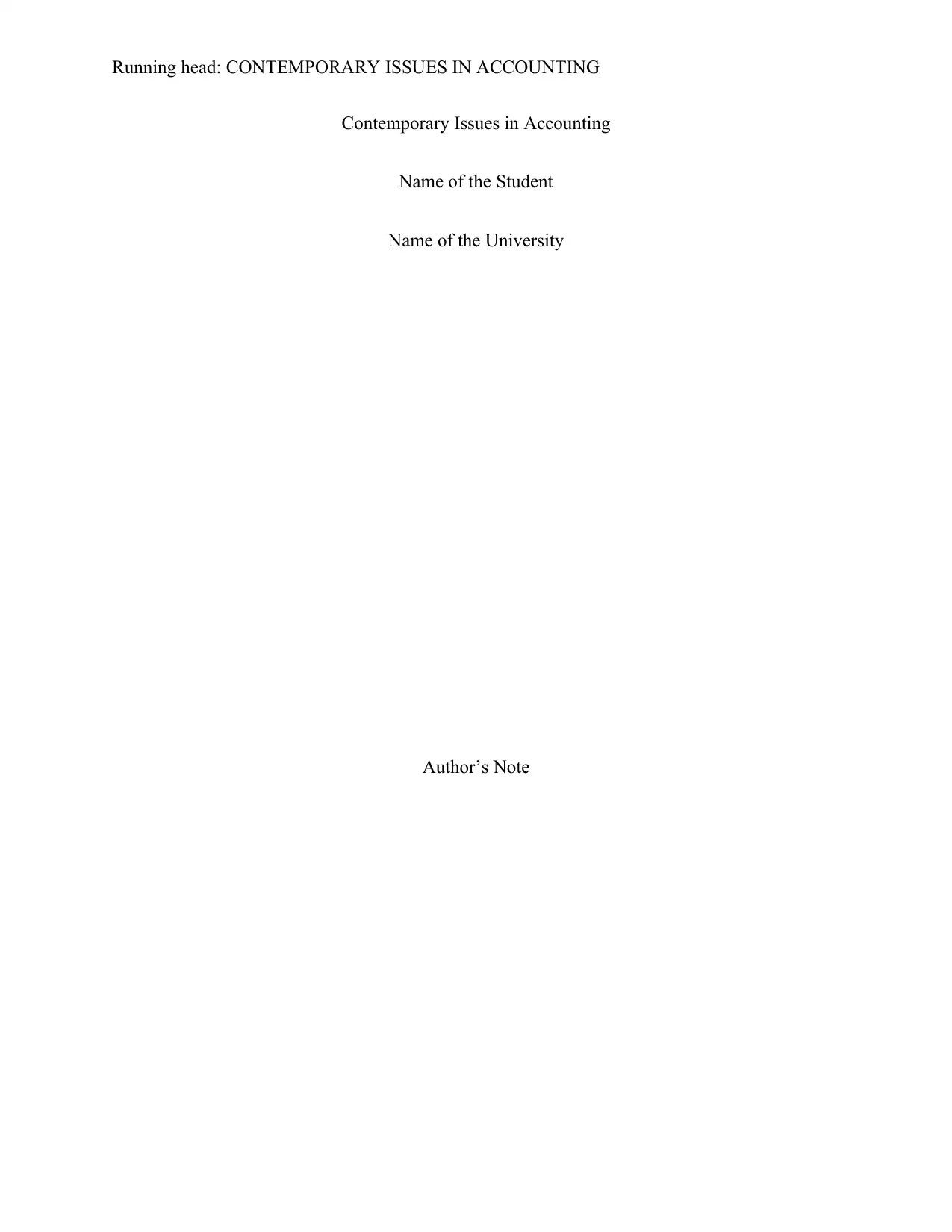
Running head: CONTEMPORARY ISSUES IN ACCOUNTING
Contemporary Issues in Accounting
Name of the Student
Name of the University
Author’s Note
Contemporary Issues in Accounting
Name of the Student
Name of the University
Author’s Note
Paraphrase This Document
Need a fresh take? Get an instant paraphrase of this document with our AI Paraphraser
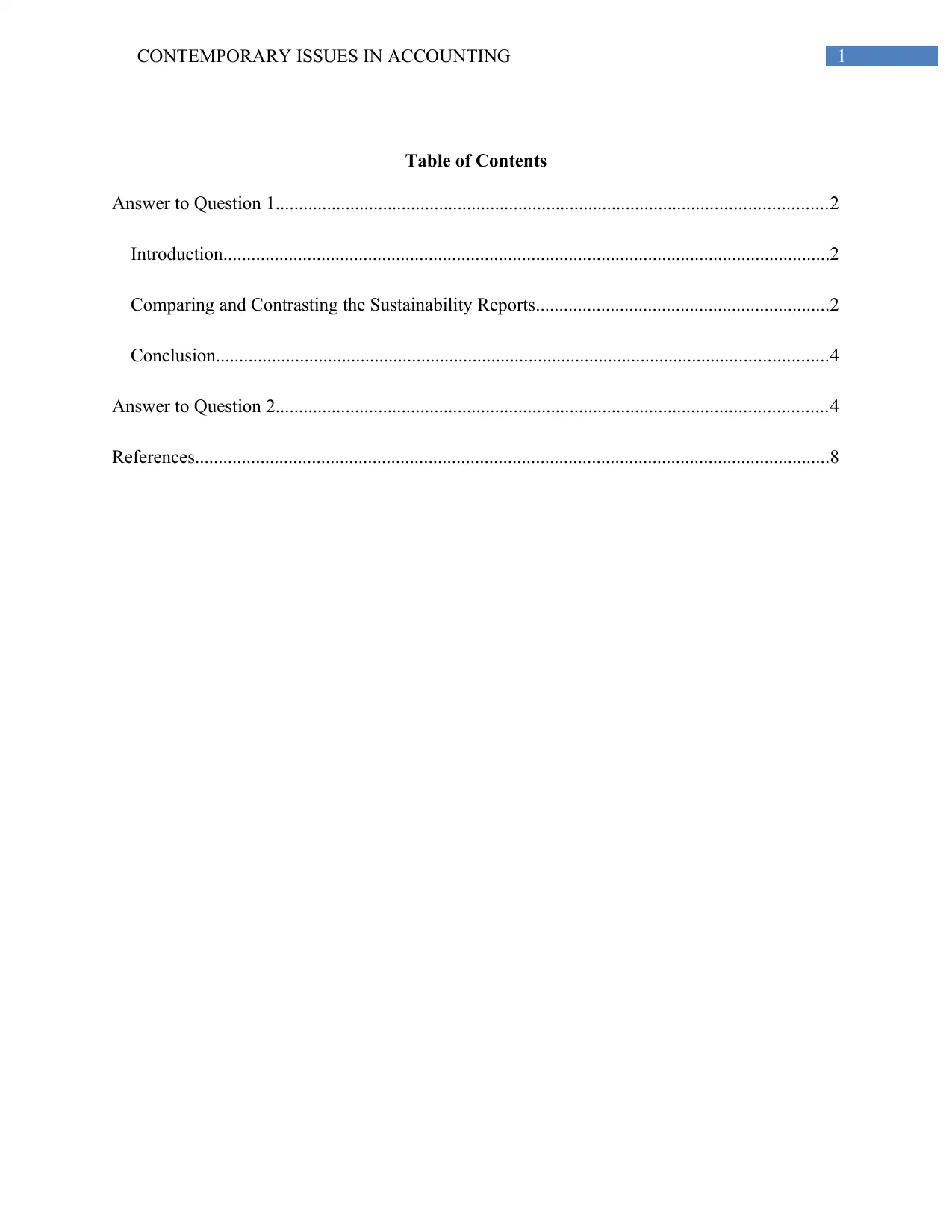
1CONTEMPORARY ISSUES IN ACCOUNTING
Table of Contents
Answer to Question 1......................................................................................................................2
Introduction..................................................................................................................................2
Comparing and Contrasting the Sustainability Reports...............................................................2
Conclusion...................................................................................................................................4
Answer to Question 2......................................................................................................................4
References........................................................................................................................................8
Table of Contents
Answer to Question 1......................................................................................................................2
Introduction..................................................................................................................................2
Comparing and Contrasting the Sustainability Reports...............................................................2
Conclusion...................................................................................................................................4
Answer to Question 2......................................................................................................................4
References........................................................................................................................................8
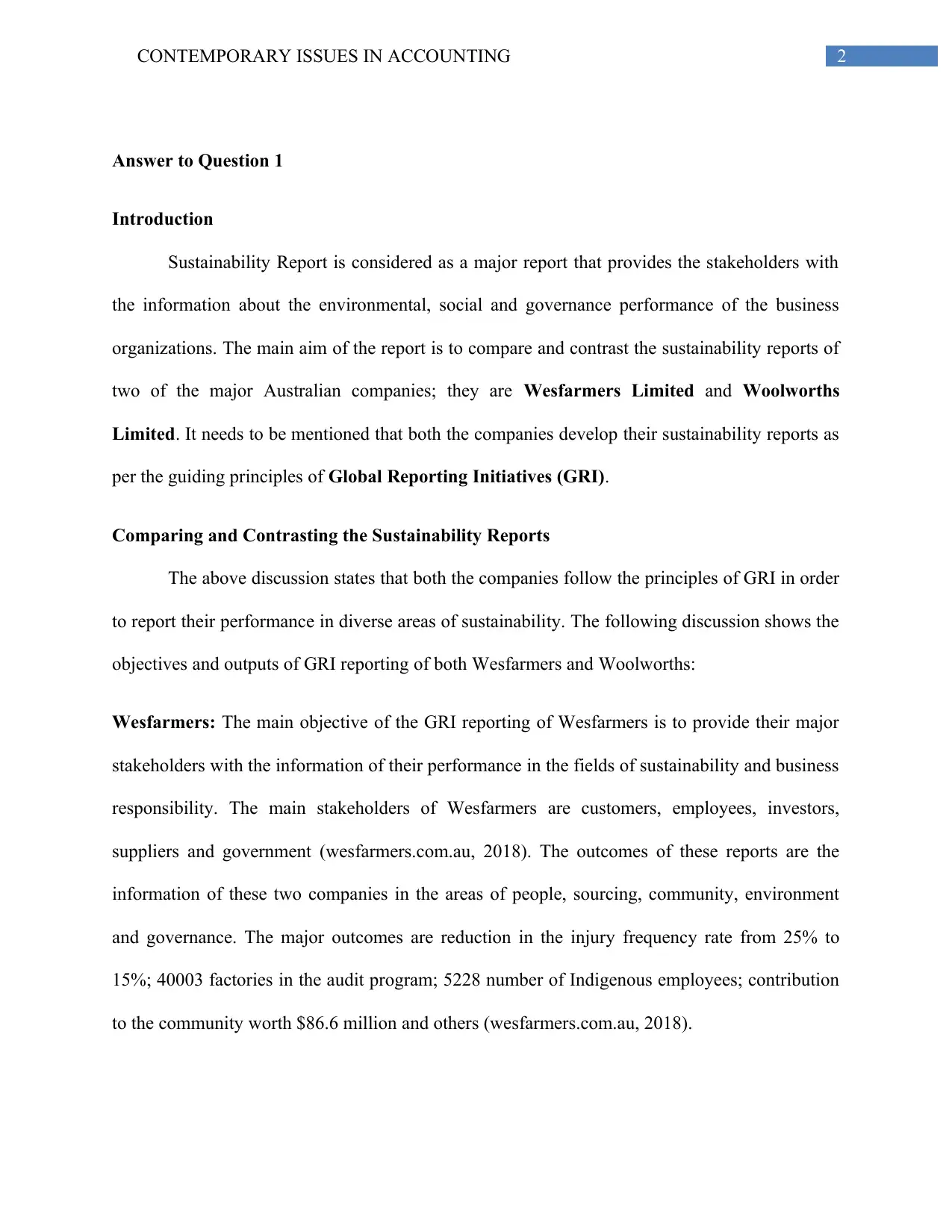
2CONTEMPORARY ISSUES IN ACCOUNTING
Answer to Question 1
Introduction
Sustainability Report is considered as a major report that provides the stakeholders with
the information about the environmental, social and governance performance of the business
organizations. The main aim of the report is to compare and contrast the sustainability reports of
two of the major Australian companies; they are Wesfarmers Limited and Woolworths
Limited. It needs to be mentioned that both the companies develop their sustainability reports as
per the guiding principles of Global Reporting Initiatives (GRI).
Comparing and Contrasting the Sustainability Reports
The above discussion states that both the companies follow the principles of GRI in order
to report their performance in diverse areas of sustainability. The following discussion shows the
objectives and outputs of GRI reporting of both Wesfarmers and Woolworths:
Wesfarmers: The main objective of the GRI reporting of Wesfarmers is to provide their major
stakeholders with the information of their performance in the fields of sustainability and business
responsibility. The main stakeholders of Wesfarmers are customers, employees, investors,
suppliers and government (wesfarmers.com.au, 2018). The outcomes of these reports are the
information of these two companies in the areas of people, sourcing, community, environment
and governance. The major outcomes are reduction in the injury frequency rate from 25% to
15%; 40003 factories in the audit program; 5228 number of Indigenous employees; contribution
to the community worth $86.6 million and others (wesfarmers.com.au, 2018).
Answer to Question 1
Introduction
Sustainability Report is considered as a major report that provides the stakeholders with
the information about the environmental, social and governance performance of the business
organizations. The main aim of the report is to compare and contrast the sustainability reports of
two of the major Australian companies; they are Wesfarmers Limited and Woolworths
Limited. It needs to be mentioned that both the companies develop their sustainability reports as
per the guiding principles of Global Reporting Initiatives (GRI).
Comparing and Contrasting the Sustainability Reports
The above discussion states that both the companies follow the principles of GRI in order
to report their performance in diverse areas of sustainability. The following discussion shows the
objectives and outputs of GRI reporting of both Wesfarmers and Woolworths:
Wesfarmers: The main objective of the GRI reporting of Wesfarmers is to provide their major
stakeholders with the information of their performance in the fields of sustainability and business
responsibility. The main stakeholders of Wesfarmers are customers, employees, investors,
suppliers and government (wesfarmers.com.au, 2018). The outcomes of these reports are the
information of these two companies in the areas of people, sourcing, community, environment
and governance. The major outcomes are reduction in the injury frequency rate from 25% to
15%; 40003 factories in the audit program; 5228 number of Indigenous employees; contribution
to the community worth $86.6 million and others (wesfarmers.com.au, 2018).
⊘ This is a preview!⊘
Do you want full access?
Subscribe today to unlock all pages.

Trusted by 1+ million students worldwide
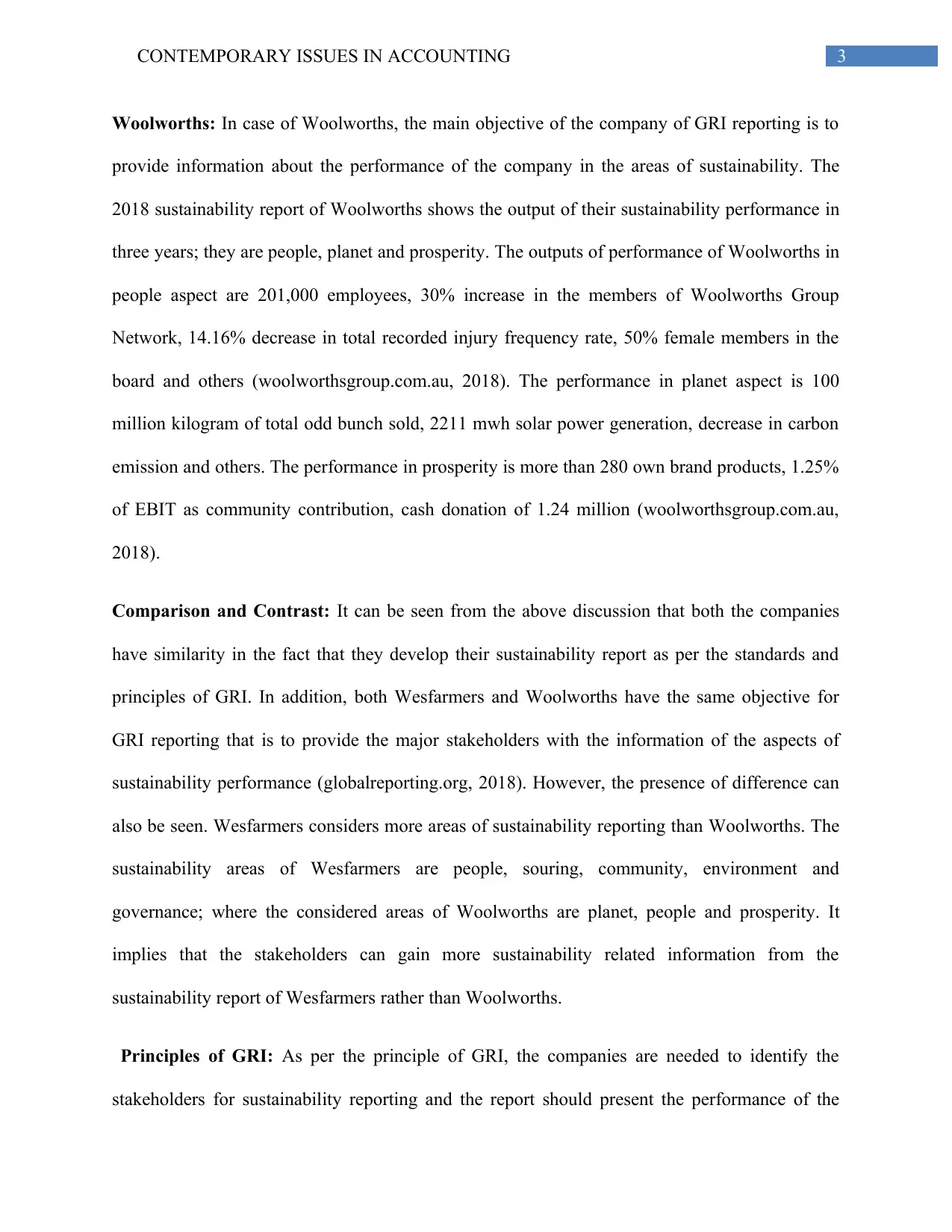
3CONTEMPORARY ISSUES IN ACCOUNTING
Woolworths: In case of Woolworths, the main objective of the company of GRI reporting is to
provide information about the performance of the company in the areas of sustainability. The
2018 sustainability report of Woolworths shows the output of their sustainability performance in
three years; they are people, planet and prosperity. The outputs of performance of Woolworths in
people aspect are 201,000 employees, 30% increase in the members of Woolworths Group
Network, 14.16% decrease in total recorded injury frequency rate, 50% female members in the
board and others (woolworthsgroup.com.au, 2018). The performance in planet aspect is 100
million kilogram of total odd bunch sold, 2211 mwh solar power generation, decrease in carbon
emission and others. The performance in prosperity is more than 280 own brand products, 1.25%
of EBIT as community contribution, cash donation of 1.24 million (woolworthsgroup.com.au,
2018).
Comparison and Contrast: It can be seen from the above discussion that both the companies
have similarity in the fact that they develop their sustainability report as per the standards and
principles of GRI. In addition, both Wesfarmers and Woolworths have the same objective for
GRI reporting that is to provide the major stakeholders with the information of the aspects of
sustainability performance (globalreporting.org, 2018). However, the presence of difference can
also be seen. Wesfarmers considers more areas of sustainability reporting than Woolworths. The
sustainability areas of Wesfarmers are people, souring, community, environment and
governance; where the considered areas of Woolworths are planet, people and prosperity. It
implies that the stakeholders can gain more sustainability related information from the
sustainability report of Wesfarmers rather than Woolworths.
Principles of GRI: As per the principle of GRI, the companies are needed to identify the
stakeholders for sustainability reporting and the report should present the performance of the
Woolworths: In case of Woolworths, the main objective of the company of GRI reporting is to
provide information about the performance of the company in the areas of sustainability. The
2018 sustainability report of Woolworths shows the output of their sustainability performance in
three years; they are people, planet and prosperity. The outputs of performance of Woolworths in
people aspect are 201,000 employees, 30% increase in the members of Woolworths Group
Network, 14.16% decrease in total recorded injury frequency rate, 50% female members in the
board and others (woolworthsgroup.com.au, 2018). The performance in planet aspect is 100
million kilogram of total odd bunch sold, 2211 mwh solar power generation, decrease in carbon
emission and others. The performance in prosperity is more than 280 own brand products, 1.25%
of EBIT as community contribution, cash donation of 1.24 million (woolworthsgroup.com.au,
2018).
Comparison and Contrast: It can be seen from the above discussion that both the companies
have similarity in the fact that they develop their sustainability report as per the standards and
principles of GRI. In addition, both Wesfarmers and Woolworths have the same objective for
GRI reporting that is to provide the major stakeholders with the information of the aspects of
sustainability performance (globalreporting.org, 2018). However, the presence of difference can
also be seen. Wesfarmers considers more areas of sustainability reporting than Woolworths. The
sustainability areas of Wesfarmers are people, souring, community, environment and
governance; where the considered areas of Woolworths are planet, people and prosperity. It
implies that the stakeholders can gain more sustainability related information from the
sustainability report of Wesfarmers rather than Woolworths.
Principles of GRI: As per the principle of GRI, the companies are needed to identify the
stakeholders for sustainability reporting and the report should present the performance of the
Paraphrase This Document
Need a fresh take? Get an instant paraphrase of this document with our AI Paraphraser
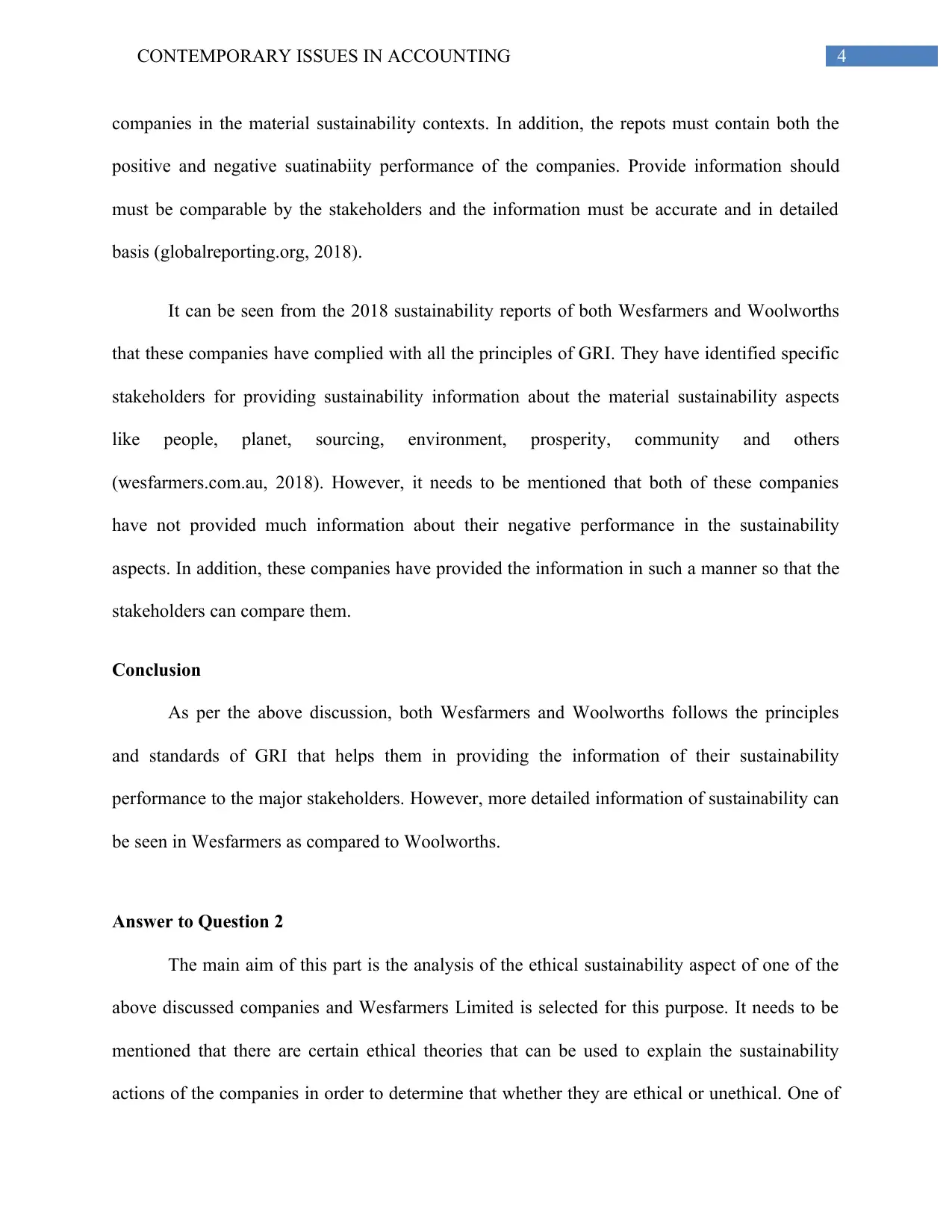
4CONTEMPORARY ISSUES IN ACCOUNTING
companies in the material sustainability contexts. In addition, the repots must contain both the
positive and negative suatinabiity performance of the companies. Provide information should
must be comparable by the stakeholders and the information must be accurate and in detailed
basis (globalreporting.org, 2018).
It can be seen from the 2018 sustainability reports of both Wesfarmers and Woolworths
that these companies have complied with all the principles of GRI. They have identified specific
stakeholders for providing sustainability information about the material sustainability aspects
like people, planet, sourcing, environment, prosperity, community and others
(wesfarmers.com.au, 2018). However, it needs to be mentioned that both of these companies
have not provided much information about their negative performance in the sustainability
aspects. In addition, these companies have provided the information in such a manner so that the
stakeholders can compare them.
Conclusion
As per the above discussion, both Wesfarmers and Woolworths follows the principles
and standards of GRI that helps them in providing the information of their sustainability
performance to the major stakeholders. However, more detailed information of sustainability can
be seen in Wesfarmers as compared to Woolworths.
Answer to Question 2
The main aim of this part is the analysis of the ethical sustainability aspect of one of the
above discussed companies and Wesfarmers Limited is selected for this purpose. It needs to be
mentioned that there are certain ethical theories that can be used to explain the sustainability
actions of the companies in order to determine that whether they are ethical or unethical. One of
companies in the material sustainability contexts. In addition, the repots must contain both the
positive and negative suatinabiity performance of the companies. Provide information should
must be comparable by the stakeholders and the information must be accurate and in detailed
basis (globalreporting.org, 2018).
It can be seen from the 2018 sustainability reports of both Wesfarmers and Woolworths
that these companies have complied with all the principles of GRI. They have identified specific
stakeholders for providing sustainability information about the material sustainability aspects
like people, planet, sourcing, environment, prosperity, community and others
(wesfarmers.com.au, 2018). However, it needs to be mentioned that both of these companies
have not provided much information about their negative performance in the sustainability
aspects. In addition, these companies have provided the information in such a manner so that the
stakeholders can compare them.
Conclusion
As per the above discussion, both Wesfarmers and Woolworths follows the principles
and standards of GRI that helps them in providing the information of their sustainability
performance to the major stakeholders. However, more detailed information of sustainability can
be seen in Wesfarmers as compared to Woolworths.
Answer to Question 2
The main aim of this part is the analysis of the ethical sustainability aspect of one of the
above discussed companies and Wesfarmers Limited is selected for this purpose. It needs to be
mentioned that there are certain ethical theories that can be used to explain the sustainability
actions of the companies in order to determine that whether they are ethical or unethical. One of
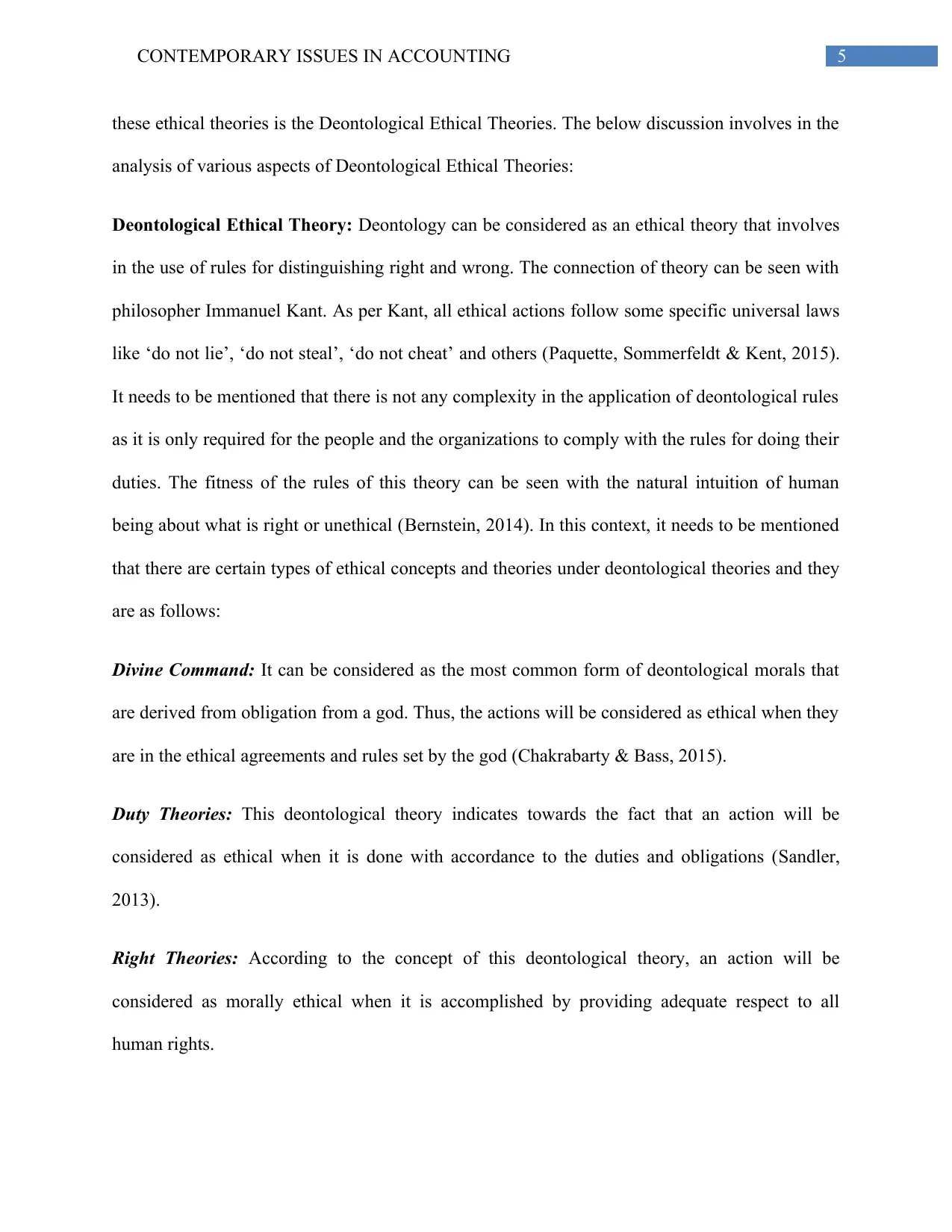
5CONTEMPORARY ISSUES IN ACCOUNTING
these ethical theories is the Deontological Ethical Theories. The below discussion involves in the
analysis of various aspects of Deontological Ethical Theories:
Deontological Ethical Theory: Deontology can be considered as an ethical theory that involves
in the use of rules for distinguishing right and wrong. The connection of theory can be seen with
philosopher Immanuel Kant. As per Kant, all ethical actions follow some specific universal laws
like ‘do not lie’, ‘do not steal’, ‘do not cheat’ and others (Paquette, Sommerfeldt & Kent, 2015).
It needs to be mentioned that there is not any complexity in the application of deontological rules
as it is only required for the people and the organizations to comply with the rules for doing their
duties. The fitness of the rules of this theory can be seen with the natural intuition of human
being about what is right or unethical (Bernstein, 2014). In this context, it needs to be mentioned
that there are certain types of ethical concepts and theories under deontological theories and they
are as follows:
Divine Command: It can be considered as the most common form of deontological morals that
are derived from obligation from a god. Thus, the actions will be considered as ethical when they
are in the ethical agreements and rules set by the god (Chakrabarty & Bass, 2015).
Duty Theories: This deontological theory indicates towards the fact that an action will be
considered as ethical when it is done with accordance to the duties and obligations (Sandler,
2013).
Right Theories: According to the concept of this deontological theory, an action will be
considered as morally ethical when it is accomplished by providing adequate respect to all
human rights.
these ethical theories is the Deontological Ethical Theories. The below discussion involves in the
analysis of various aspects of Deontological Ethical Theories:
Deontological Ethical Theory: Deontology can be considered as an ethical theory that involves
in the use of rules for distinguishing right and wrong. The connection of theory can be seen with
philosopher Immanuel Kant. As per Kant, all ethical actions follow some specific universal laws
like ‘do not lie’, ‘do not steal’, ‘do not cheat’ and others (Paquette, Sommerfeldt & Kent, 2015).
It needs to be mentioned that there is not any complexity in the application of deontological rules
as it is only required for the people and the organizations to comply with the rules for doing their
duties. The fitness of the rules of this theory can be seen with the natural intuition of human
being about what is right or unethical (Bernstein, 2014). In this context, it needs to be mentioned
that there are certain types of ethical concepts and theories under deontological theories and they
are as follows:
Divine Command: It can be considered as the most common form of deontological morals that
are derived from obligation from a god. Thus, the actions will be considered as ethical when they
are in the ethical agreements and rules set by the god (Chakrabarty & Bass, 2015).
Duty Theories: This deontological theory indicates towards the fact that an action will be
considered as ethical when it is done with accordance to the duties and obligations (Sandler,
2013).
Right Theories: According to the concept of this deontological theory, an action will be
considered as morally ethical when it is accomplished by providing adequate respect to all
human rights.
⊘ This is a preview!⊘
Do you want full access?
Subscribe today to unlock all pages.

Trusted by 1+ million students worldwide
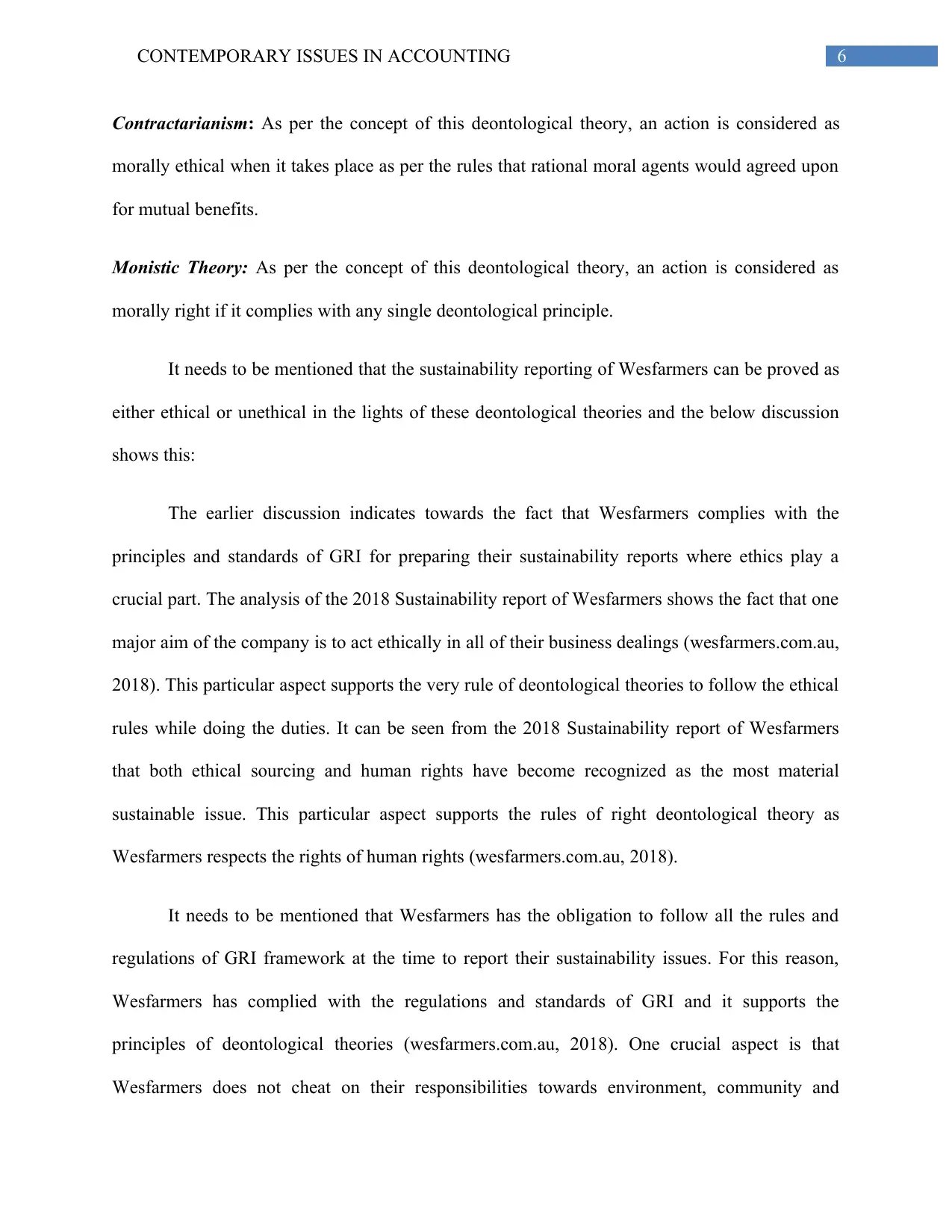
6CONTEMPORARY ISSUES IN ACCOUNTING
Contractarianism: As per the concept of this deontological theory, an action is considered as
morally ethical when it takes place as per the rules that rational moral agents would agreed upon
for mutual benefits.
Monistic Theory: As per the concept of this deontological theory, an action is considered as
morally right if it complies with any single deontological principle.
It needs to be mentioned that the sustainability reporting of Wesfarmers can be proved as
either ethical or unethical in the lights of these deontological theories and the below discussion
shows this:
The earlier discussion indicates towards the fact that Wesfarmers complies with the
principles and standards of GRI for preparing their sustainability reports where ethics play a
crucial part. The analysis of the 2018 Sustainability report of Wesfarmers shows the fact that one
major aim of the company is to act ethically in all of their business dealings (wesfarmers.com.au,
2018). This particular aspect supports the very rule of deontological theories to follow the ethical
rules while doing the duties. It can be seen from the 2018 Sustainability report of Wesfarmers
that both ethical sourcing and human rights have become recognized as the most material
sustainable issue. This particular aspect supports the rules of right deontological theory as
Wesfarmers respects the rights of human rights (wesfarmers.com.au, 2018).
It needs to be mentioned that Wesfarmers has the obligation to follow all the rules and
regulations of GRI framework at the time to report their sustainability issues. For this reason,
Wesfarmers has complied with the regulations and standards of GRI and it supports the
principles of deontological theories (wesfarmers.com.au, 2018). One crucial aspect is that
Wesfarmers does not cheat on their responsibilities towards environment, community and
Contractarianism: As per the concept of this deontological theory, an action is considered as
morally ethical when it takes place as per the rules that rational moral agents would agreed upon
for mutual benefits.
Monistic Theory: As per the concept of this deontological theory, an action is considered as
morally right if it complies with any single deontological principle.
It needs to be mentioned that the sustainability reporting of Wesfarmers can be proved as
either ethical or unethical in the lights of these deontological theories and the below discussion
shows this:
The earlier discussion indicates towards the fact that Wesfarmers complies with the
principles and standards of GRI for preparing their sustainability reports where ethics play a
crucial part. The analysis of the 2018 Sustainability report of Wesfarmers shows the fact that one
major aim of the company is to act ethically in all of their business dealings (wesfarmers.com.au,
2018). This particular aspect supports the very rule of deontological theories to follow the ethical
rules while doing the duties. It can be seen from the 2018 Sustainability report of Wesfarmers
that both ethical sourcing and human rights have become recognized as the most material
sustainable issue. This particular aspect supports the rules of right deontological theory as
Wesfarmers respects the rights of human rights (wesfarmers.com.au, 2018).
It needs to be mentioned that Wesfarmers has the obligation to follow all the rules and
regulations of GRI framework at the time to report their sustainability issues. For this reason,
Wesfarmers has complied with the regulations and standards of GRI and it supports the
principles of deontological theories (wesfarmers.com.au, 2018). One crucial aspect is that
Wesfarmers does not cheat on their responsibilities towards environment, community and
Paraphrase This Document
Need a fresh take? Get an instant paraphrase of this document with our AI Paraphraser
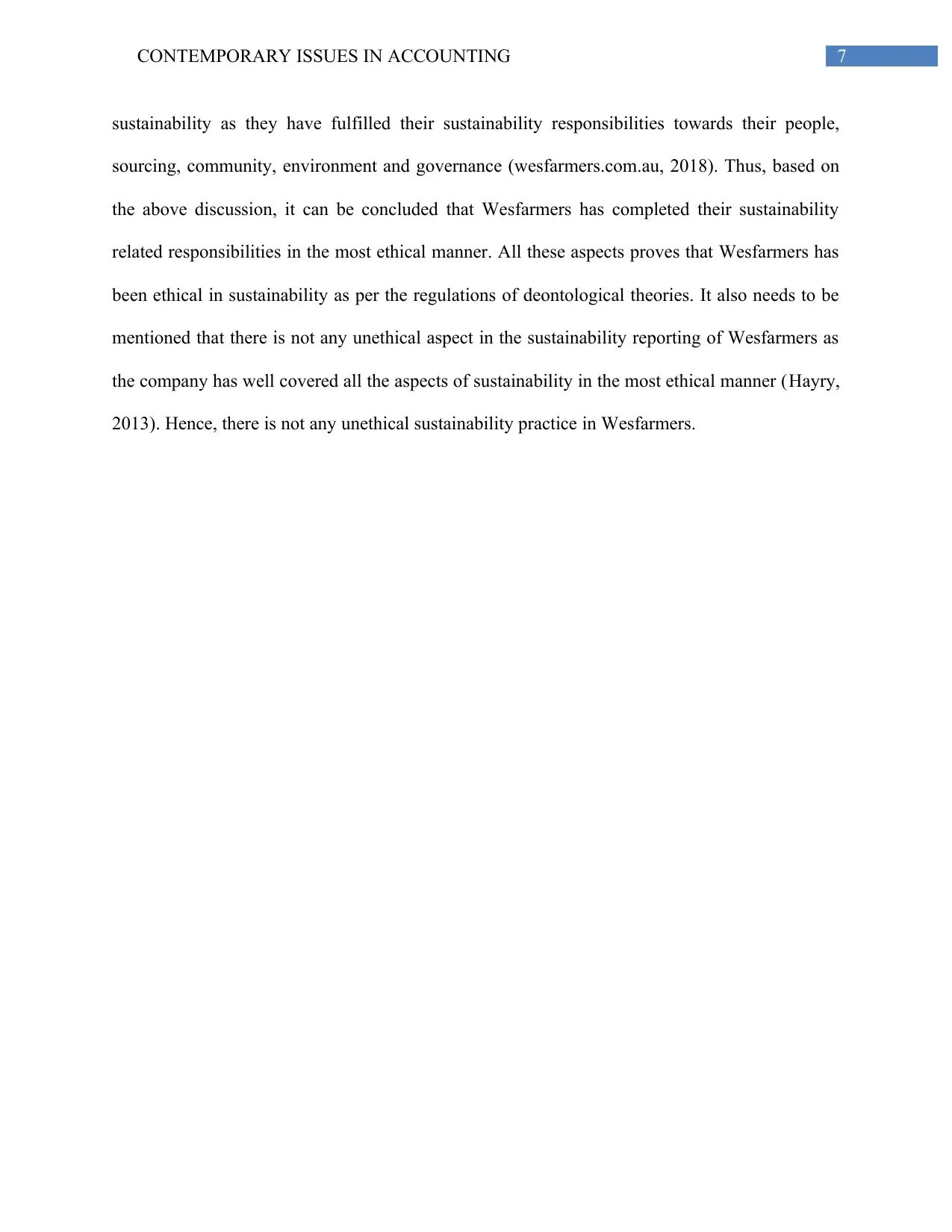
7CONTEMPORARY ISSUES IN ACCOUNTING
sustainability as they have fulfilled their sustainability responsibilities towards their people,
sourcing, community, environment and governance (wesfarmers.com.au, 2018). Thus, based on
the above discussion, it can be concluded that Wesfarmers has completed their sustainability
related responsibilities in the most ethical manner. All these aspects proves that Wesfarmers has
been ethical in sustainability as per the regulations of deontological theories. It also needs to be
mentioned that there is not any unethical aspect in the sustainability reporting of Wesfarmers as
the company has well covered all the aspects of sustainability in the most ethical manner (Hayry,
2013). Hence, there is not any unethical sustainability practice in Wesfarmers.
sustainability as they have fulfilled their sustainability responsibilities towards their people,
sourcing, community, environment and governance (wesfarmers.com.au, 2018). Thus, based on
the above discussion, it can be concluded that Wesfarmers has completed their sustainability
related responsibilities in the most ethical manner. All these aspects proves that Wesfarmers has
been ethical in sustainability as per the regulations of deontological theories. It also needs to be
mentioned that there is not any unethical aspect in the sustainability reporting of Wesfarmers as
the company has well covered all the aspects of sustainability in the most ethical manner (Hayry,
2013). Hence, there is not any unethical sustainability practice in Wesfarmers.
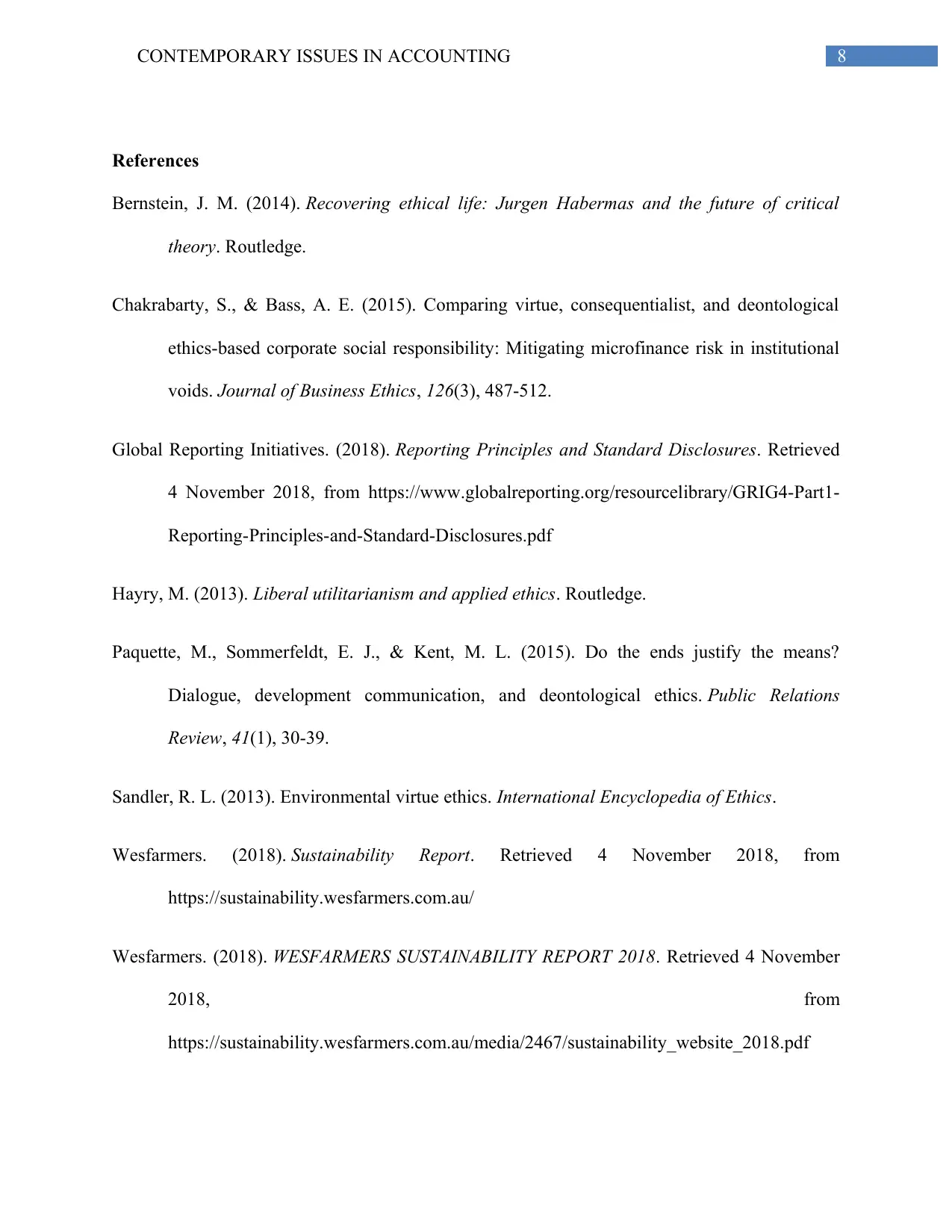
8CONTEMPORARY ISSUES IN ACCOUNTING
References
Bernstein, J. M. (2014). Recovering ethical life: Jurgen Habermas and the future of critical
theory. Routledge.
Chakrabarty, S., & Bass, A. E. (2015). Comparing virtue, consequentialist, and deontological
ethics-based corporate social responsibility: Mitigating microfinance risk in institutional
voids. Journal of Business Ethics, 126(3), 487-512.
Global Reporting Initiatives. (2018). Reporting Principles and Standard Disclosures. Retrieved
4 November 2018, from https://www.globalreporting.org/resourcelibrary/GRIG4-Part1-
Reporting-Principles-and-Standard-Disclosures.pdf
Hayry, M. (2013). Liberal utilitarianism and applied ethics. Routledge.
Paquette, M., Sommerfeldt, E. J., & Kent, M. L. (2015). Do the ends justify the means?
Dialogue, development communication, and deontological ethics. Public Relations
Review, 41(1), 30-39.
Sandler, R. L. (2013). Environmental virtue ethics. International Encyclopedia of Ethics.
Wesfarmers. (2018). Sustainability Report. Retrieved 4 November 2018, from
https://sustainability.wesfarmers.com.au/
Wesfarmers. (2018). WESFARMERS SUSTAINABILITY REPORT 2018. Retrieved 4 November
2018, from
https://sustainability.wesfarmers.com.au/media/2467/sustainability_website_2018.pdf
References
Bernstein, J. M. (2014). Recovering ethical life: Jurgen Habermas and the future of critical
theory. Routledge.
Chakrabarty, S., & Bass, A. E. (2015). Comparing virtue, consequentialist, and deontological
ethics-based corporate social responsibility: Mitigating microfinance risk in institutional
voids. Journal of Business Ethics, 126(3), 487-512.
Global Reporting Initiatives. (2018). Reporting Principles and Standard Disclosures. Retrieved
4 November 2018, from https://www.globalreporting.org/resourcelibrary/GRIG4-Part1-
Reporting-Principles-and-Standard-Disclosures.pdf
Hayry, M. (2013). Liberal utilitarianism and applied ethics. Routledge.
Paquette, M., Sommerfeldt, E. J., & Kent, M. L. (2015). Do the ends justify the means?
Dialogue, development communication, and deontological ethics. Public Relations
Review, 41(1), 30-39.
Sandler, R. L. (2013). Environmental virtue ethics. International Encyclopedia of Ethics.
Wesfarmers. (2018). Sustainability Report. Retrieved 4 November 2018, from
https://sustainability.wesfarmers.com.au/
Wesfarmers. (2018). WESFARMERS SUSTAINABILITY REPORT 2018. Retrieved 4 November
2018, from
https://sustainability.wesfarmers.com.au/media/2467/sustainability_website_2018.pdf
⊘ This is a preview!⊘
Do you want full access?
Subscribe today to unlock all pages.

Trusted by 1+ million students worldwide
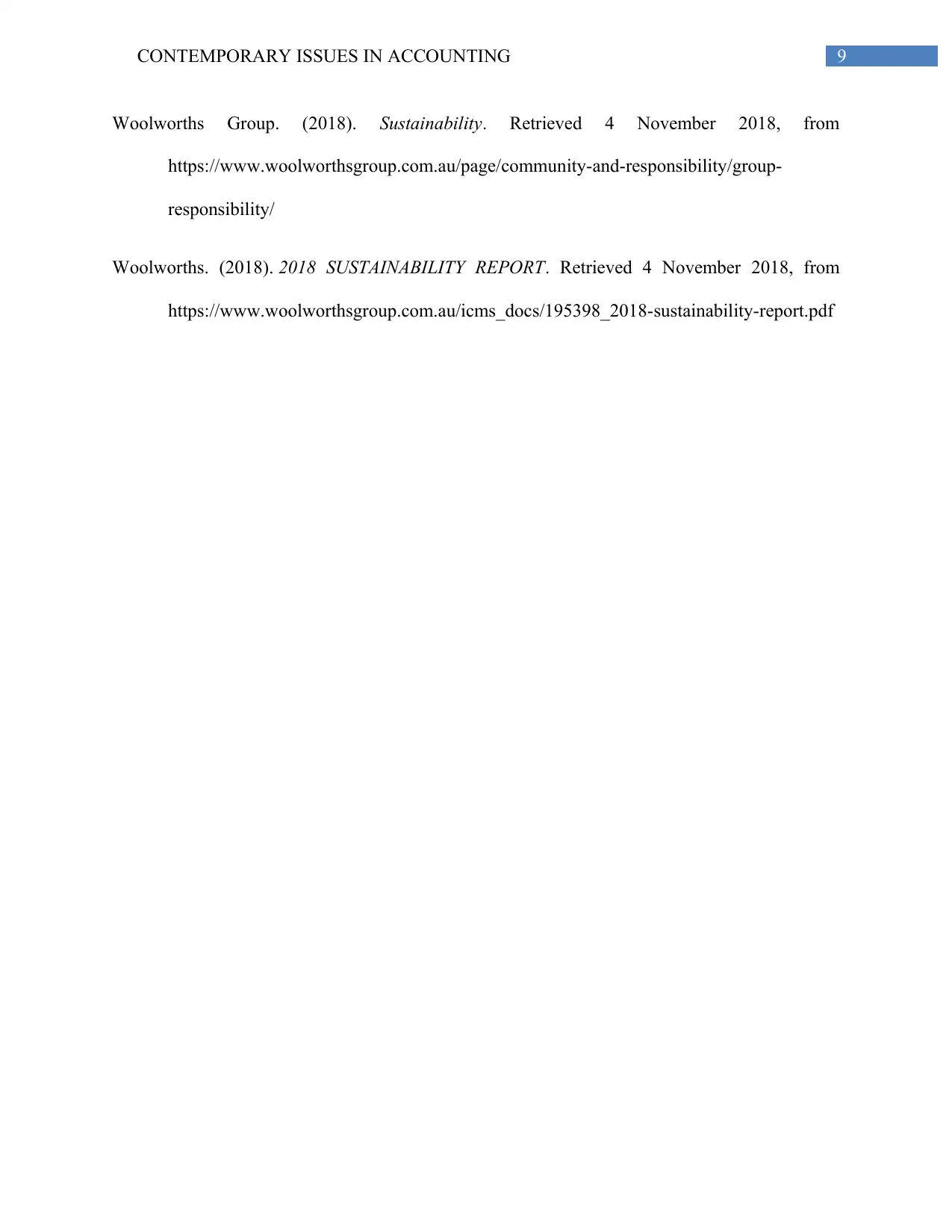
9CONTEMPORARY ISSUES IN ACCOUNTING
Woolworths Group. (2018). Sustainability. Retrieved 4 November 2018, from
https://www.woolworthsgroup.com.au/page/community-and-responsibility/group-
responsibility/
Woolworths. (2018). 2018 SUSTAINABILITY REPORT. Retrieved 4 November 2018, from
https://www.woolworthsgroup.com.au/icms_docs/195398_2018-sustainability-report.pdf
Woolworths Group. (2018). Sustainability. Retrieved 4 November 2018, from
https://www.woolworthsgroup.com.au/page/community-and-responsibility/group-
responsibility/
Woolworths. (2018). 2018 SUSTAINABILITY REPORT. Retrieved 4 November 2018, from
https://www.woolworthsgroup.com.au/icms_docs/195398_2018-sustainability-report.pdf
1 out of 10
Related Documents
Your All-in-One AI-Powered Toolkit for Academic Success.
+13062052269
info@desklib.com
Available 24*7 on WhatsApp / Email
![[object Object]](/_next/static/media/star-bottom.7253800d.svg)
Unlock your academic potential
Copyright © 2020–2026 A2Z Services. All Rights Reserved. Developed and managed by ZUCOL.




